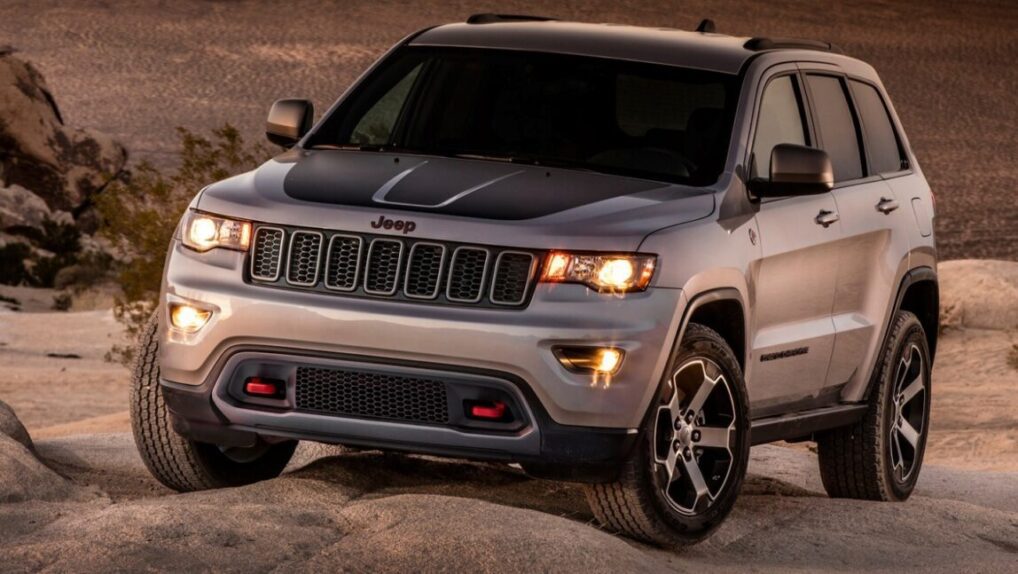Table Of Contents [show]
Jeep Grand Cherokees have long been a staple of the SUV market, known for their rugged capabilities and impressive off-road prowess. However, beyond their reputation as a capable SUV, there is another factor that plays a crucial role in their overall performance – weight.
Weight affects the Grand Cherokee in numerous ways, including fuel efficiency, towing capacity, and handling. So, just how much does a Jeep Grand Cherokee weigh? The answer is not as straightforward as you might think.
Jeep Grand Cherokees come in a variety of trims, each with different features and equipment, resulting in varying weights. Additionally, the weight can also change depending on whether you opt for a two-wheel drive or four-wheel drive model. In this article, we dive into the weight of the Jeep Grand Cherokee, exploring the factors that contribute to its weight and what it means for the vehicle’s overall performance.
So, buckle up and prepare to embark on a journey to uncover the truth behind the weight of the Jeep Grand Cherokee.
Weight of The Jeep Grand Cherokee Through The Generations
The Jeep Grand Cherokee has a rich history that spans over three decades. Its evolution from its early beginnings to its current state is a testament to the automaker’s commitment to improving the vehicle and keeping up with the changing demands of the market. Let’s take a closer look at each generation of the Jeep Grand Cherokee:
1st Generation (1993-1998) – The first generation of the Jeep Grand Cherokee was introduced in 1993 as a 1994 model year. It was based on the Jeep ZJ platform and was offered in two trim levels: the base Laredo and the up-level Limited. This generation marked the first time that a Jeep vehicle was offered with an automatic transmission, which was a 4-speed unit. In terms of weight, the first generation Grand Cherokee weighed between 4,000 and 4,400 pounds.
2nd Generation (1999-2004) – The second generation of the Jeep Grand Cherokee was introduced in 1999 as a 2000 model year. It was based on the WJ platform and received a complete overhaul, both inside and out. The second-gen Grand Cherokee was available in several trim levels, including the Laredo, Limited, Overland, and special edition models. In terms of weight, the second-gen Grand Cherokee weighed between 4,400 and 4,800 pounds.
3rd Generation (2005-2010) – The third generation of the Jeep Grand Cherokee was introduced in 2005 as a 2006 model year. It was based on the WK platform and marked a departure from the boxy design of previous generations, with a more aerodynamic look and feel. The third-gen Grand Cherokee was offered in several trim levels, including the Laredo, Limited, Overland, and SRT8. In terms of weight, the third-gen Grand Cherokee weighed between 4,600 and 5,200 pounds.
4th Generation (2011-2018) – The fourth generation of the Jeep Grand Cherokee was introduced in 2011 as a 2012 model year. It was based on the WK2 platform and was available in several trim levels, including the Laredo, Limited, Overland, Summit, and SRT8. The fourth-gen Grand Cherokee received several updates and improvements, including a new exterior design, updated interior, and new technologies. In terms of weight, the fourth-gen Grand Cherokee weighed between 4,500 and 5,500 pounds.
5th Generation (2019-Present) – The fifth generation of the Jeep Grand Cherokee was introduced in 2019 as a 2020 model year. It is based on the WL platform and features a new design, updated technology, and improved performance. The fifth-gen Grand Cherokee is available in several trim levels, including the Laredo, Limited, Overland, Summit, SRT, and Trackhawk. In terms of weight, the fifth-gen Grand Cherokee weighs between 4,500 and 5,000 pounds. A Jeep owner on the JeepForum had this to say about the weight of their Grand Cherokee – “The Trailhawk’s skid plates, tires, and hood decal adds between 243 to 258 pounds to a Limited”
As you can see, the weight of the Jeep Grand Cherokee has evolved over the years, becoming lighter and more aerodynamic with each new generation. Despite these changes, the Grand Cherokee remains a formidable presence on the road, offering exceptional performance and capability.
Why Is Jeep Grand Cherokee Weight Important
When it comes to the Jeep Grand Cherokee, weight is a critical factor that affects several aspects of the vehicle’s performance. From fuel efficiency to towing capacity, weight plays a crucial role in determining the overall capabilities of the Grand Cherokee.
Fuel Efficiency – One of the most significant impacts of weight on the Grand Cherokee is fuel efficiency. The heavier the vehicle, the more energy it takes to move it, leading to decreased fuel efficiency. Every extra pound in the Grand Cherokee’s weight results in a decrease in fuel efficiency, and over time, this can add up to a significant amount of money. For this reason, reducing the weight of the Grand Cherokee has been a priority for Jeep engineers, who have been working to make the vehicle lighter and more aerodynamic with each new generation.

Towing Capacity – Another important aspect of weight in the Grand Cherokee is towing capacity. The weight of the vehicle has a direct impact on the maximum amount of weight it can safely tow. The heavier the Grand Cherokee, the lower its towing capacity. This can be a major consideration for those who need to tow heavy loads, such as a boat or a trailer, on a regular basis.
Handling and Stability – Weight also affects the handling and stability of the Grand Cherokee. The more weight the vehicle has, the harder it is to maneuver and the more challenging it is to maintain control. This can be particularly noticeable when driving in off-road conditions, where a lighter vehicle will be more nimble and easier to handle.
In conclusion, weight is a critical factor in the performance of the Jeep Grand Cherokee, affecting several aspects of the vehicle, including fuel efficiency, towing capacity, and handling. Understanding the importance of weight can help you make an informed decision when buying a Grand Cherokee, allowing you to choose the right model that meets your specific needs and requirements.
How To Reduce Jeep Grand Cherokee Weight
Jeep engineers have been working to reduce the weight of the Grand Cherokee with each new generation, and there are several ways they have been able to achieve this. Here are some of the most effective methods for reducing the weight of the Grand Cherokee:
Lightweight materials – One of the most effective ways to reduce the weight of the Grand Cherokee is by using lightweight materials. This includes materials such as aluminum, magnesium, and carbon fiber, which are lighter and stronger than traditional materials such as steel and iron. By incorporating these materials into the vehicle’s design, engineers have been able to reduce the weight of the Grand Cherokee without sacrificing strength or durability.
Slimming down components – Another way to reduce the weight of the Grand Cherokee is by slimming down components. This includes everything from the engine and transmission to the suspension and braking system. By using lighter components, engineers have been able to reduce the weight of the Grand Cherokee without sacrificing performance or reliability.
Engine optimization – Another way to reduce the weight of the Grand Cherokee is by optimizing the engine. By using more efficient engines that produce the same power with less weight, engineers have been able to reduce the overall weight of the vehicle.
Streamlining the design – Streamlining the design of the Grand Cherokee is another effective way to reduce its weight. By removing unnecessary features and components, engineers have been able to make the vehicle more aerodynamic and lighter.
By incorporating these methods, engineers have been able to reduce the weight of the Jeep Grand Cherokee with each new generation, making it a lighter, more fuel-efficient, and better-performing vehicle.
What Increases Jeep Grand Cherokee Weight

While reducing the weight of the Grand Cherokee has several benefits, there are also several factors that can increase the weight of the vehicle. Understanding these factors can help you make an informed decision when buying a Grand Cherokee, allowing you to choose the right model that meets your specific needs and requirements.
“It really just depends on what has been added. Mine has no back seat, and a soft top, but does have a winch, heavy front bumper, rock sliders, skids, and a tire carrier bumper on the back and is on 35’s. It weighs out at 3750.” Is what a user on the wranglerforum had to say about the weight of their Jeep.
Additional features and equipment – One of the main factors that can increase the weight of the Grand Cherokee is the addition of features and equipment. From larger wheels and more luxurious interiors to advanced safety features and technological upgrades, the more features a Grand Cherokee has, the heavier it will be.
Larger engines – Another factor that can increase the weight of the Grand Cherokee is a larger engine. Engines with more power and displacement are generally heavier than smaller engines, leading to a significant increase in the weight of the vehicle.
Four-wheel drive systems – Four-wheel drive systems are also a significant factor that can increase the weight of the Grand Cherokee. These systems add weight to the vehicle, making it heavier and less fuel-efficient.
Increased body size – Another factor that can increase the weight of the Grand Cherokee is an increased body size. As the Grand Cherokee has grown in size over the years, it has become heavier, making it a less nimble and more challenging vehicle to maneuver.
There are several factors that can increase the weight of the Jeep Grand Cherokee, including additional features and equipment, larger engines, four-wheel drive systems, and increased body size. Understanding these factors can help you make an informed decision when buying a Grand Cherokee, allowing you to choose the right model that meets your specific needs and requirements.
How Much Does A Jeep Grand Cherokee Weight – FAQs
Q: What is the average weight of a Jeep Grand Cherokee?
A: The average weight of a Jeep Grand Cherokee ranges from 4,500 to 5,000 pounds, depending on the year, model, and trim level.
Q: How does the weight of a Jeep Grand Cherokee impact its performance?
A: The weight of a Jeep Grand Cherokee has a direct impact on its performance, including fuel efficiency, handling, and stability. A lighter vehicle will have improved fuel efficiency, better handling, and be more stable on the road.
Q: What materials are used to reduce the weight of a Jeep Grand Cherokee?
A: Jeep engineers use lightweight materials such as aluminum, magnesium, and carbon fiber to reduce the weight of the Grand Cherokee. These materials are lighter and stronger than traditional materials such as steel and iron, allowing engineers to reduce the weight of the vehicle without sacrificing strength or durability.
Q: Does reducing the weight of a Jeep Grand Cherokee affect its reliability and durability?
A: No, reducing the weight of a Jeep Grand Cherokee does not affect its reliability or durability. By using lightweight materials and slimming down components, engineers have been able to reduce the weight of the vehicle without sacrificing performance or reliability.
Q: What are some factors that can increase the weight of a Jeep Grand Cherokee?
A: Some factors that can increase the weight of a Jeep Grand Cherokee include additional features and equipment, larger engines, four-wheel drive systems, and increased body size.
Q: How does a larger engine impact the weight of a Jeep Grand Cherokee?
A: A larger engine will increase the weight of a Jeep Grand Cherokee, as engines with more power and displacement are generally heavier than smaller engines.
Q: How does the addition of four-wheel drive impact the weight of a Jeep Grand Cherokee?
A: The addition of four-wheel drive will increase the weight of a Jeep Grand Cherokee, as these systems add weight to the vehicle, making it heavier and less fuel-efficient.
Q: How does the size of a Jeep Grand Cherokee impact its weight?
A: An increased body size of a Jeep Grand Cherokee will increase its weight, making it a less nimble and more challenging vehicle to maneuver.
Q: How do different trim levels impact the weight of a Jeep Grand Cherokee?
A: Different trim levels of the Jeep Grand Cherokee can impact its weight, as models with more features and equipment will generally be heavier than those with fewer features.
Q: Are there any aftermarket modifications that can reduce the weight of a Jeep Grand Cherokee?
A: Yes, there are several aftermarket modifications that can reduce the weight of a Jeep Grand Cherokee, including the use of lightweight materials for components, engine optimization, and streamlining the design of the vehicle. However, it’s important to ensure that these modifications are performed by a professional to ensure proper installation and to avoid affecting the reliability and durability of the vehicle.
How Much Does A Jeep Grand Cherokee Weight – Conclusion
In conclusion, the weight of a Jeep Grand Cherokee is an important factor to consider when it comes to its performance, fuel efficiency, and handling. The average weight of a Grand Cherokee ranges from 4,500 to 5,000 pounds, depending on the year, model, and trim level. By reducing the weight of the vehicle, engineers have been able to improve its performance and fuel efficiency, while maintaining its reliability and durability.

There are several factors that can increase the weight of a Jeep Grand Cherokee, including larger engines, four-wheel drive systems, and increased body size. However, these factors can be balanced out by the use of lightweight materials and aftermarket modifications, making the Grand Cherokee a great choice for those who want a powerful and efficient SUV.


